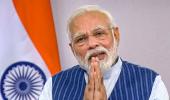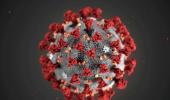'The josh is very high as we fight this global pandemic.'

Three frontline doctors -- those who first screen people with suspected COVID-19 cases before they are asked to go for tests and then subsequent isolation, quarantine and treatment -- tells Prasanna D Zore/Rediff.com how bravely and systematically the pandemic is being handled.
Dr Kalyani Dongre, Resident Doctor, Department of Community Medicine
I wrote a letter to Maharashtra Chief Minister Uddhav Thackeray as a member of the advisory committee, Central MARD (Maharashtra Association of Resident Doctors) and we are the ones working in the frontline right now.
When I wrote this letter (on March 24), the crisis were very acute.
As soon as I issued the letter, I got a call from the chief minister's office within 4-5 hours and they assured better arrangements for personal protection equipments, N95 masks and sanitisers will be done in a better way for the medical staff working at the frontline of fighting the pandemic.
Immediately the same day we got all the requirements needed at BMC (BrihanMumbai Municipal Corporation)-run hospitals.
Given the circumstances, the state government is trying its level best to provide us with the best they can.
As a responsible organisation we also understand that the state government cannot pull out all its resources and give us what we want. But to work fearlessly on the frontline we had requested for PPEs, N95 masks and hand sanitisers because most of us are working in three sectors: Screening, isolation and quarantine and treatment of COVID-19 positive patients.
For screening, we require different kind of setups at the OPDs (outpatient department) for checking people for symptoms.
I wrote this letter because all the resident doctors, interns and supporting staff working at the OPDs were using just one mask for three-four days. I am talking about the situation that existed on March 23.
By the same evening we got the stock and I think my letter brought out the urgency of the situation and desperation of the staff.
I also sent this letter to all the NGOs and other charitable organisations and we got a huge response from the state government and these NGOs.
NGOs are now providing us with masks, PPEs and even food because we were having shortage of food at these hospitals because the canteens are short-staffed and some of them are not working at all.
Taj Hospitality of the Tata Group has started providing lunch and dinner to our staff at the Kasturba, Sion, and KEM Hospital.
We are treating this pandemic in a phased manner. We are not exposing all the doctors right now at this stage; we are going in a step-wise manner.
Few of us are working in the disaster management cell, few are doing screenings at OPDs, few of us are working out of home where people call them and clear their doubts about COVID-19 symptoms and provide prescriptions on the phone for those not showing COVID-19 like symptoms and give further directions to those showing the symptoms for going for screenings at various BMC hospitals.
Few of us are treating patients who test COVID-19 positive.
Not just Mumbai, but other parts of Maharashtra are also facing the crisis and we are looking at it from a holistic view.
At places where the cases of COVID-19 positive are few, like in Nagpur, we are going all out with screenings and isolation programmes.
We have started the screening process even at places like Miraj, Ambejogai (small, tier II towns) and other smaller villages and block levels. The government is actually doing a fantastic job.
Everybody is stretched for resources; be it human resources or monetary resources, but the fight goes on.
***
Dr Satish Nair, MARD President, Screening patients at Nair Hospital's OPD
We are wholeheartedly with the government in fighting the pandemic and will go to whichever place the government want to post us.
We are ready to tackle everything as per our knowledge, or experiences. All our doctors have been trained to tackle it.
We are updating all our trained doctors with latest changes and guidelines issued by the ICMR (Indian Council of Medical Research), WHO (World Health Organisation). We are updating these doctors on an hourly basis.
On its part, the government is providing our doctors at the OPD who screen patients with necessary equipment like the PPEs, goggles, suits that protect us from head to toe, N95 masks, triple layered surgical masks and hand sanitisers to all our doctors and support medical staff at Nair Hospital.
All doctors working at the OPD have rotational duties. Staff from all the departments at Nair Hospital are adequately trained to handle the patients who come for screening at our OPD round the clock.
All the doctors working in the OPD wear PPEs 24x7 and only then screening the patients. Few of us are doing eight-hours, few are working for 12-hours depending upon the flow of patients at the OPD. Four-five doctors are present round the clock in every shift.
We follow all the protocols and guidelines issued by the ICMR, WHO and MARD while screening patients for COVID-19 symptoms.
It is mandatory to wear PPEs while screening the patients for protecting ourselves.
At the screenings after checking them for symptoms we also ask patients about their travel history, if they have come in contact with any (COVID-19) positive patient, and symptoms they are showing.
According to that we are taking decisions about if we have to send them for testing, ask them to be home quarantined or clear them as people showing no symptoms.
The consulting doctor takes a call after screening whether s/he must ask the patient to go for sample testing of her/his nasal or throat swab. That is the standard protocol followed after screening.
The swabs are then sent for testing and it then a different set of administrators and doctors take over from us.
We have already taken the Hippocratic Oath so there is no way we will go back on the oath. Not even a single doctor is refusing to do whatever work comes her/his way in our collective fight against the COVID-19 pandemic.
The josh is very high as we are fighting against this global pandemic.
'I'm assuring that all of us are ready to fight against this pandemic. So the morale of the doctors is quite high and we all are feeling confident that we will defeat coronavirus.
I can confidently say that none of our medical staff or patients who had come here till today for screening has tested positive or shown COVID-19 like symptoms. That is the intensity with which we are taking our protection and precautions seriously.
We do talk about how frontline doctors have been dying in different parts of the world, but not a single doctor working here is scared to tackle the load we are facing right now.
Being resident doctors who stay in hostels and somebody who are screening hundreds of patients every day for COVID-19 symptoms most of us have decided not to go back to our homes for the next two-three months not only because we want to avoid travelling at this stage, but also because we don't know how long will it take for us to control the spread of COVID-19.
Our people need us more than our families do at this time.
For now most of our families are a bit tensed; we will get to know their reactions only when we meet them. But when we speak on the phone they say they are feeling very proud that we are doing our bit to help fight this pandemic.
***
Dr Vishal Rakh screened travellers at Mumbai airport and is now posted at a BMC helpline centre
I worked at the Chhatrapati Shivaji Maharaj International Airport from March 6 to 22 and am now posted at BMC's helpline centre.
I was posted at the airport till all the airports were locked down for international traffic (on March 22). Now, I am engaged in managing panic calls and calls coming for seeking guidance at the BMC's helpline centre in Mumbai.
Here we are guiding people about COVID-19 symptoms, answering their queries, helping those panicking to calm down.
At the airport, a team of about 20 doctors would screen travellers. I was posted there from March 6 till March 22 for screening international travellers. Before March 6 screening was done by doctors sent by the central government along with the airport staff.
After the outbreak of COVID-19, a team of doctors from BMC-run hospitals was deputed there.
From March 6, all the doctors and medical staff at the CSMIA screened around 10,000 travellers daily.
Those who were suspected to show COVID-19-like symptoms were directly sent to the Kasturba hospital for testing. Those who travelled with people showing COVID-19-like symptoms were sent into quarantine for 14 days at the Seven Hills Hospital. If they too showed COVID-19 symptoms in those 14 days they too were tested for COVID-19.
Basically, when we were posted there, initially the passengers were not cooperative. After WHO declared it to be a pandemic everybody became aware of how serious the spread was and voluntarily co-operated for screenings and testing.
Still some people tried to outsmart the doctors by taking medicines like anti-diuretics so that they don't show any temperature during thermal screening and could have possibly escaped from our screenings.
Those who did not show symptoms like fever, cough or breathlessness were allowed to go home and asked to home quarantine themselves for 14 days.
Those suspects were reported to the IDSP (Integrated Disease Surveillance Programme). Then officials of IDSP department would call them on the phone to ask them if they have developed any of these symptoms. That helps the public health department to trace patients.
On an average we get 1,200-1,300 calls daily. These calls centre around asking for more information about the symptoms of COVID-19, what are the criteria for going for testing, what kind of prescription and travel history is required for one to become eligible for testing, about buying over the counter prophylactics like (hydrochloroquine) from pharmacy shops, and what should be the dosage and schedule of these prophylactics.
There are calls where people inform us about people from their society who have had just returned from international travel and whether that person has developed any symptoms or refusing to show willingness to go for testing.
Our public health department officials then trace the person's location and convince or force her/him to go for COVID-19 test.
Yesterday (Saturday), a person from a north Mumbai suburb called us up saying that a traveller arrived from London from March 10 in their society and is roaming around freely.
Immediately, our people traced him and admitted him to the Kasturba hospital because he showed symptoms. All his family members are now under home quarantine for 14 days.
Right now, most of the calls we get are from people who are panicking. Maximum cals are panic calls.
Even if a person develops a single symptom (like fever, or coughing, or breathlessness), even pharyngitis (common cold without breathlessness) s/he calls us saying s/he is showing (COVID-19) symptoms.
We share guidelines issued by the ICMR, WHO with that person and calm her/him down by either asking her/him to quarantine himself or talk to her/his family doctor or physician.
Only when a person shows some serious symptoms do we send our health officers to her/his home and decide upon the next line of action.
There are about five teams right now, each team comprising 15 people, doing eight-hour rotational duties attending calls.
We have a portal where we enter the name of the caller, her/his details, and symptoms which then automatically is available to the state health department online.
Depending on the signal that this data generates (a red signal means health officers visit the person's home for further clarification and decide upon subsequent action) our health officers take a call on how to proceed.










